Is there a cure for jet lag? We tested the latest remedies to find out
![New hotel treatments, nap pods, cabin lighting tricks - but does any of it work? - www.peopleimages.com (www.peopleimages.com (Photographer) - [None]](https://s.yimg.com/ny/api/res/1.2/cyrSTbKCKYNdgYmklpeIcw--/YXBwaWQ9aGlnaGxhbmRlcjt3PTEyNDI7aD03NzY-/https://media.zenfs.com/en-GB/the_telegraph_818/92244798f4d7b44a8663fe1444e564a5)
There once was a time when we rose with the sun and had nothing to do when darkness fell except go to bed. Artificial light didn't come to the masses until about a century ago, air travel took off 50 years after; add in the internet and we live in a society which has to some extent done away with the concept of night and day.
This drastic lifestyle overhaul has come with side effects. Enter jet lag, an unavoidable sickness with no cure. Not yet anyway, though the travel industry has stepped up its game of late in addressing the concerns of exhausted travellers. "Jet lag has had an economic impact, and capitalism rarely waits," remarks Christopher J Lee, professor and author of Jet Lag. “Sleep is therefore being commodified.”
Newer planes, like the Boeing 787 Dreamliner, have design elements aimed at easing the damage flying does to our circadian rhythms, such as changing cabin illumination hues that mimic dawn and dusk. "Nap pods" are popping up at airports and in cities around the world. Hotels are offering special spa treatments, and even rehydration IVs, which are said to address the symptoms of jet lag.
Does any of it actually work? Or, much like the stubborn hangover, have we failed to make much progress with beating it? We spoke to several sleep experts and road-tested some of these new offerings to investigate. But first...
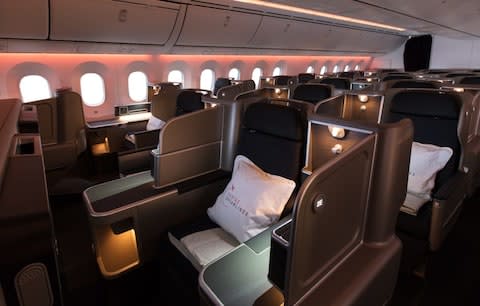
What is jet lag?
"It is worth emphasising that jet lag is not the same as ordinary fatigue," writes Lee. "While crowded cabins, uncomfortable seats, and crying children can be contributing factors to the exhaustion of air travel, jet lag is not an effect of these circumstances. Rather, it is the outcome of our biological clocks, which are set to a particular place, coming into conflict with the time of the place of our arrival due to the speed of air travel.
"Jet lag can therefore occur whenever a single time zone is crossed. But it is most strongly felt when multiple time zones are involved. Put simply, this is why one feels so awful arriving in London Heathrow at 8am in the morning from JFK: it still feels like 2am in New York. Your body has travelled faster than your body’s ability to reset its inner clock, better known as your circadian rhythm."
The hotels trying to solve it
... or at least help. There are numerous hotels now offering treatments targeted at exhausted travellers. Villa Dubrovnik, Croatia, has a "Diamond" spa experience in which guests lie in a cocoon-like chamber atop a layer of warm bubbling water to the tune of soothing music. Dubai's Jumeirah Emirates Towers has a similar salt water flotation tank. In Japan, resorts including Hotel Okura in Tokyo, offer light therapy lamps that mimic natural sunlight and help speed up the time zone re-adjustment.
Closer to home, the Sheraton Grand London on Park Lane has just opened a library in its Club Lounge with a curated selection of books that are designed to help you nod off. The ZZZ-list Collection of 30 books is a collaboration between Hatchards, the oldest bookseller in London, and sleep psychologist Dr David Lewis, who advises guests to eschew their smartphones before bed and instead read these "snooze inducing" titles.
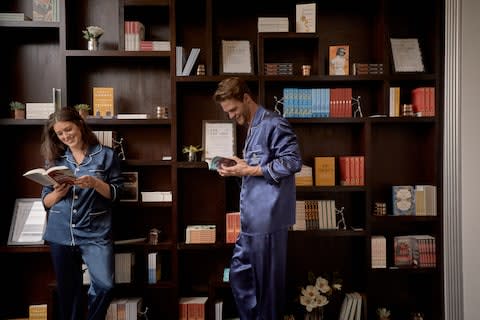
So what makes a book worthy of a spot on this bookshelf? Titles that avoid a large amount of detail and follow a simple narrative structure, such as the Penguin Book of English Short Stories, will help the reader drift off, says Lewis. Stories with concluding chapter ends - i.e. no cliffhangers - such as Jojo Moyes' Still Me also make the cut.
Finally, prose constructed with lengthier sentences produce long, slow alpha waves in the brain that are more conducive to a relaxed state; Wind, Sand and Stars, by Antoine de Saint-Exupéry, being a good example. This is the book I opted for when I stayed at the Sheraton after visiting the ZZZ-list library. It's a lovely memoir written by a French aristocrat and pilot in 1939, of his years flying around the world. I'm not sure it helped me fall asleep any faster than usual, but as someone who usually drifts off with the TV on in the background, it made for a satisfying change in routine.
I may have had a good sleep, but for many people dozing off is actually harder in a hotel environment with an unfamiliar bed. "The brain is, essentially, a pattern matching device," Lewis says. "We make sense of the world by matching the incoming data from our senses to patterns already established, by past experiences, in memory.
"Because an unfamiliar bedroom presents a whole host of new patterns, the brain has to accommodate these, which leads to an alert state that makes it harder to rest. The more closely a hotel bedroom resembles our own, therefore, the easier it will be for us to settle and become more relaxed." The take-home? Make sure to fiddle with the lighting and temperature before getting into a hotel bed - they're the only aspect you can control to create a more homely environment.

Does Melatonin help with jet lag?
According to Lewis, yes. "Melatonin is a hormone, released from the pineal gland in the brain, that plays a central part in regulating bodily rhythms and has been shown to have a positive effect in re‐aligning these when they are thrown on of balance," he says.
"Studies have shown that Melatonin is remarkably effective in preventing or reducing jet lag, with researchers recommending it to adults flying across five or more time zones." You can buy it in tablet form, from Amazon.
What about an IV drip?
These have been growing in popularity for some years now, with the appearence of mobile nurse services that will come to you on demand and hook you up to a vitamain-infused fluid drip - like IV Boost, to address the dehydration that flying causes. London hotel The Ned also offers VitaDrips by The Elixir Clinic.
Their jet-lag drip is a concoction of taurine (the same stuff in Red Bull) to give you a jolt of energy; zinc, magnesium and potassium, which are all electrolytes and work for your circulation and immune system; and Vitamin B12, which also enhances energy levels as well as mood. Telegraph Travel's Charlotte Johnstone, suitably jet-lagged, surrendered her veins to test it out.
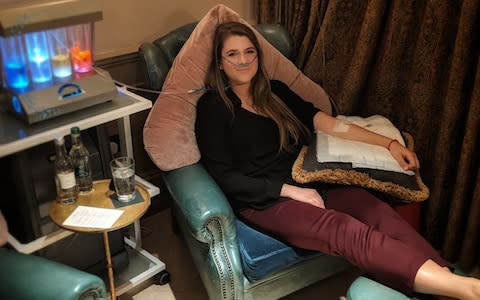
"I'm tempted to say that the mere psychological effects of knowing that I was having a lavish, luxurious treatment goes some way to combat the conundrum in my mind," she reported back, but said she did notice she had "more energy and looked visibly brighter" following the treatment.
My own experience with these IVs is that they don't do much to alleviate jet lag but do work wonders on a hangover.
Sleeping pods
"Nap pods", as they are often known, are exactly what they sound like: pods in which to nap. Google famously has them on-site at its Silicon Valley base so that tired employees can recharge (or, as the cynics would say, so they have no excuse to leave the office). But more recently they've been popping up in airports to serve passengers with long layovers or delayed flights.
Our very own Greg Dickinson found himself in a GoSleep pod at Finland's Helsinki Airport, and summarises his experience thus: "During a particularly dramatic snow storm back, everything at Helsinki airport ground to a halt. Flights were cancelled, hotel rooms were divvied out to capacity, and I found myself faced with two choices. Sleep on my winter coat on the floor, or pay £40 to spend the night in a GoSleep pod."
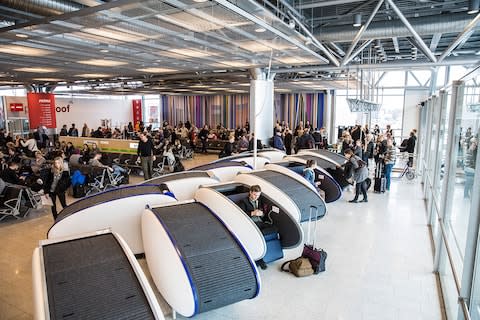
"The pod it was," he goes on. "I found a couple of dozen of the things lined up in a quiet corner of the airport. There are no dividing walls between the pods, so preparing for bed is a fairly public experience for all (how Scandinavian). I rolled down the top for privacy and, with a miniature reading light poking into my head, drifted into a half-sleep – serenaded by the orchestra of rustling and snoring neighbours around me.
"Peculiar, not entirely dignified, claustrophobic? Perhaps. But I did sleep. So I would do it again, but probably only when I'm next stranded by a snow storm."
No UK airport has yet installed nap pods, but one company, Pop & Rest, last year launched a similar offering in Shoreditch, where you can book yourself a private "booth" for between 30 minutes and four hours. I checked in to one for an hour during an office lunch break to see what it entailed, and though I didn't actually sleep (short naps aren't a skill I've ever managed to master), I certainly emerged rested.
The site currently has six booths in one small warehouse facility, and the units are more like mini hotel rooms than the pods you'll find at airports. Each is decked out with a single bed, fresh bed linen, a side table, lamp, earplugs and an eye mask.
It's certainly an odd feeling, crawling fully-clothed under the duvet in an alien place at lunch time, but I can see the appeal. Comfortably reclined, I read a little, had a few WhatsApp exchanges and daydreamed. Normally, I wander the streets with a podcast for company during my lunch break; having a lie-down, even without the sleep, definitely recharged me. If it were within walking distance from my office, I imagine I'd use it fairly frequently.
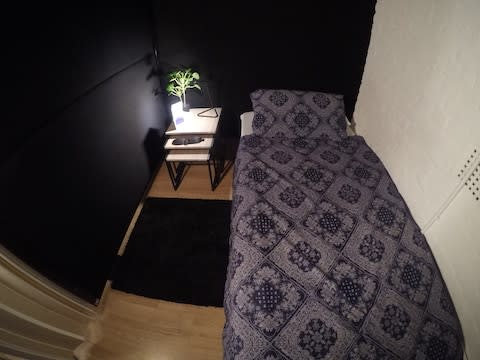
Maruicio Villamizar, Pop & Rest's co-founder, who as a European has always taken the concept of a siesta seriously, told me: "Our clientele falls into two categories. The first are local workers, whose offices are in Shoreditch, Moorgate, Bank and Angel, some who have been working night shifts, but also new parents who need a break from their babies. The second is travellers, people from Europe, the US and Asia who - often jet-lagged - book our pods in between meetings, before flights or hotel check-ins."
The average duration booked is 90 minutes, he says, which makes sense given that's the length of a sleep cycle. I can't resist asking, given he is essentially renting out private bedrooms for short periods of time, how he's managed to avoid unwittingly becoming a "bring your own" brothel, and Villamizar does concede that couples request booths "all the time". His solution has been to turn them down. "These pods are for sleeping or meditating," he says, "they're for single use only."
Having used one of the pods, I can safely say that a good brothel it would not make. Each booth is divided by a thin wall with no sound-proofing, so the concept's downside is that you can hear every cough, and every movement from your neighbours (thus the ear plugs). Villamizar is addressing this in his next phase, and I did get to peer into his first soundproof prototype, which will be a key improvement to the service.
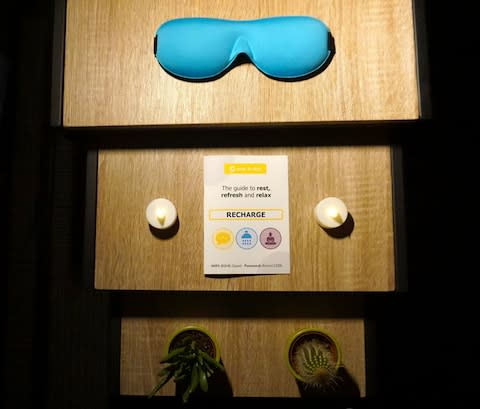
Ultra long-haul flying
Aircraft models of today are now capable of flying further than ever before, which means that getting from one end of the world to the other can be done in a single leap with no layover (the longest being Singapore Airlines' 18-hour Singapore-New York service). Is this better, or even worse when it comes to jet lag?
Having personally flown to and from Australia every year since childhood to visit family, and taken Qantas' 17-hour direct route from London to Perth aboard its Dreamliner in January (the world's third longest commercial flight), I found it to be a marathon, yes, but overall a huge improvement.
Qantas has done a good job of applying real science to this flight experience - which they did in association with the University of Sydney's Charles Perkins Centre.
The year prior, scientists monitored 20 passengers on the route's first flight to see how their bodies responded, with the goal of tinkering with the cabin atmosphere going forward. To gather the data, passengers were fitted with two medical grade devices that recorded sleep, physical activity and changes in posture - one on the wrist and the other on the thigh.
Subjects were also asked to complete questionnaires about their overall state of mind, and how they felt before, during and after the flight.
The results? In addition to the temperature and gentle lighting, they've tweaked the air system, increasing the humidity and maintaining a cabin altitude of about 6,000ft (around 2,000ft lower than usual). I'm fairly sure I felt less dried out as a result; and I appreciated the warm orange lights that kicked in gradually about two hours before landing, just in time for breakfast.
I doubt it did much to ease my overall jet lag once I disembarked but the flight was more than averagely comfortable in economy, the direct route sliced at least four hours off the total journey time, and I didn't miss that grim stopover in the Middle East one bit.
A last resort - do as the Queen does
The best thing for jet lag, ultimately, is sleep. Nap pods therefore serve a widespread and ever-increasing need when it comes to snooze-starved travellers and workaholics. For me, the concept is long-overdue and I hope to see more of them spring up.
Or you could take a leaf out of the Queen's bedtime story, and pop a barley sugar lozenge into your mouth. Indeed, Her Majesty - officially the most widely travelled head of state in history - reportedly treats her own jet lag with boiled sweets.
We asked GP Dr Nick Knight, who has a specialist interest in lifestyle medicine, to shed some light. “Carrying out your daily habits like eating and sleeping in line with your new destination's time zone - both en-route and on arrival - helps re-synchronise our body clock to our new environment," he says.
"What the Queen is doing by having barley sugar is essentially using her body’s sugar metabolic pathways to help adjust her body clock. It is a little niche but essentially the same should happen if you were to have your breakfast, lunch and dinner at times that match your destination before you get there, regardless of whether you're hungry or not. Doing this instead of just consuming barley sugar will obviously be more filling."
How do you manage your jet lag? Do share any nuggets of wisdom in the comment box below.
Inspiration for your inbox
Sign up to Telegraph Travel's new weekly newsletter for the latest features, advice, competitions, exclusive deals and comment.

